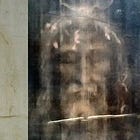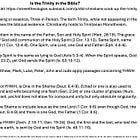Pre-40 AD Evidence For The Resurrection: 1-Minute Case From Early Creed
PLUS Bonus 1-Minute Case For The Resurrection
First Corinthians 15:3–7 contains an early Christian creed summarising the resurrection: “Christ died for our sins in accordance with the Scriptures… he was buried… he was raised on the third day in accordance with the Scriptures… he appeared to Cephas, then to the twelve… then to more than five hundred… then to James, then to all the apostles.” Paul adds in verse 8: “Last of all… he appeared also to me.”
This creed, scholars agree, did not originate with Paul. He “received” it mirroring rabbinic language for passing on sacred tradition—meaning it predates his writing and likely his conversion (c. AD 33–35).
Moreover, Ehrman notes that v.3–5 follow a “creedal formula”—a tightly constructed, parallel structure—and that this “terse statement of faith” uses vocabulary distinct from Paul’s usual language, possibly reflecting an earlier Aramaic source.
Ehrman takes a slightly different view to many of the scholars quoted below, claiming only v.3–5 were pre-Pauline, yet, concedes, “This passage almost certainly contains a pre-Pauline confession, or creed, of some kind” and if it goes back to before Paul joined the movement in 33 AD “it would be very ancient indeed (p.161, How Jesus Became God)!”
This early creed affirms that Jesus died for sins in fulfilment of Old Testament prophecy (Isaiah 53, Psalm 22), was buried, rose on the third day “in accordance with the Scriptures” (Hosea 6:2, Jonah 1:17 typology), and appeared to named individuals and groups—including over 500 witnesses, most of whom were still alive when Paul wrote.

Scholars on the Creed’s Early Origins
Gerd Lüdemann (Atheist NT scholar):“The elements in the tradition are to be dated to the first two years after the crucifixion… not later than three years.” (The Resurrection of Jesus, 1994, p.171–72).
Robert Funk (Jesus Seminar): “The conviction that Jesus had risen from the dead had already taken root by the time Paul was converted… the time for development was two or three years at most.” (The Acts of Jesus, p.466).
James Dunn:“This tradition, we can be entirely confident, was formulated as tradition within months of Jesus’ death.” (Jesus Remembered, 2003, p.854–55).
Michael Goulder (Atheist NT Professor): “[It] goes back at least to what Paul was taught when he was converted… a couple of years after the crucifixion.” (Resurrection Reconsidered, 1996, p.48)
Oxford Companion to the Bible:“The earliest record of these appearances is to be found in 1 Corinthians 15:3–7… not later than Paul’s visit to Jerusalem in 35 CE.” (Oxford, 1993, p.647).
This isn’t legend—it’s resurrection testimony grounded in Old Testament prophecy and early eyewitness tradition, dating within years, possibly months, of the crucifixion.
The narrative behind it? Jesus dying for your sins and being raised in victory. The resurrection changes everything. It proves Jesus is who He said He is. This hope, is available to all who turn to Him in repentance and faith.
Bonus: 1-Minute Case For The Resurrection
Atheist turned deist, Anthony Flew, referred to the evidence for the resurrection as different in “quality or quantity” from any miracle in any religion. Jesus died. Non-Christian scholars Lüdemann and Ehrman, claim Jesus dying by crucifixion is "indisputable" and "one of the most certain facts of history”.
Tomb was found empty. This is supported by a creed in 1 Corinthians 15:3-8 that non-Christian scholars Lüdemann, Funk and Goulder date to within several years of Jesus' death at the latest! You also wouldn’t make up women as the first evangelists in an era where their testimony was not trusted. Nor make up a burial by a Sanhedrin member (Joseph of Arimathea) when the Sanhedrin sought to kill Jesus.
The disciples claimed Jesus appeared to them. As attested in the early creed (1 Cor. 15:3-8) and multiple independent sources. Ehrman agrees "we can say with complete certainty that some of his disciples at some later time insisted that.. he soon appeared to them" (1999, p.230-31). They were prepared to die for this belief and preached in the same public and obvious areas where Jesus lived and died.
Were the disciples deceived, deceivers or speaking the truth? Did they die for a lie they made up? Surely not. How did enemies of Christianity like Paul and James (supported by Clement of Rome, Hegesippus, Josephus etc too) also change after their resurrection experiences? Why could no one bring out the body? A spiritual-only resurrection would be completely foreign to first-century Jews and the other dozen or so messianic movements in the 100 years before or after Jesus, died off when their leader died off. What best explains these facts?
To assume miracles can't happen no matter what is to argue in a circle. Jesus, charged with blasphemy, claimed to be God by calling himself the divine Son of Man from Daniel 7 (Mark 14:60-64). He died in service, as a ransom for many (Matt. 20:28). As NT Wright articulates, the rise of Christianity cannot be explained unless "Jesus rose again, leaving an empty tomb behind him."















